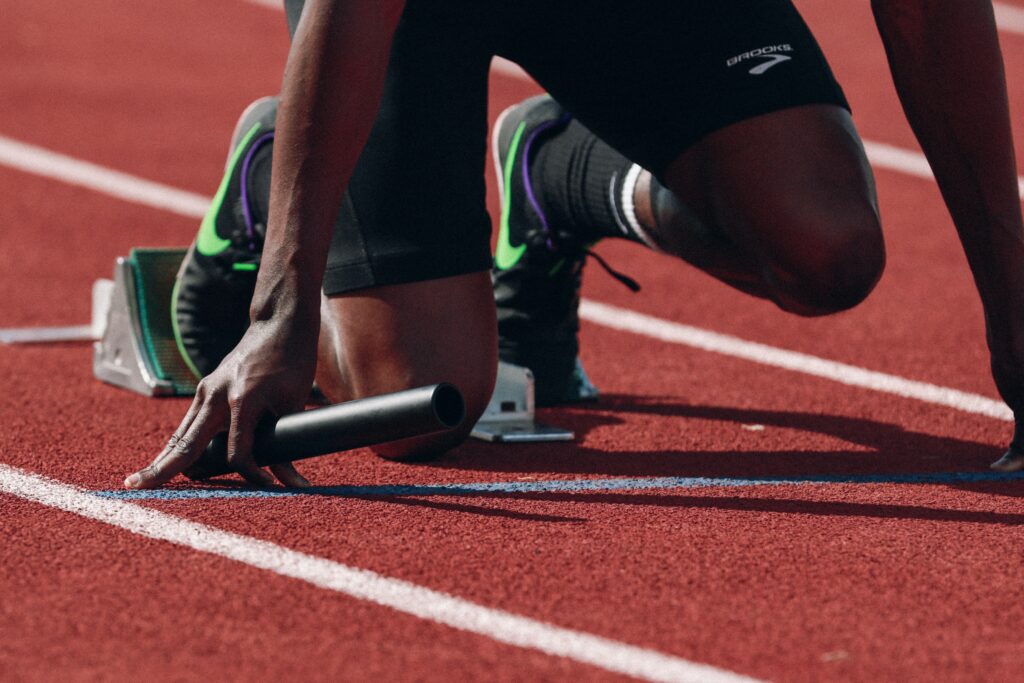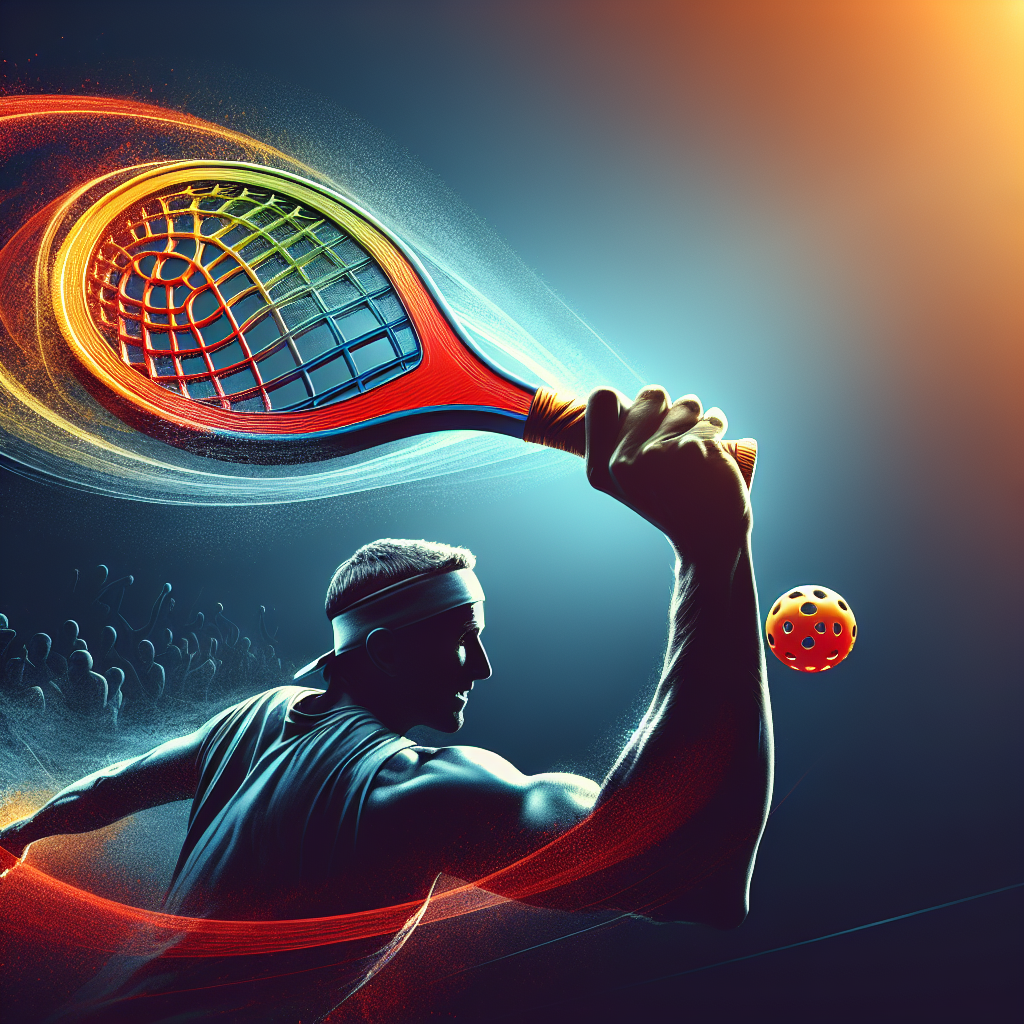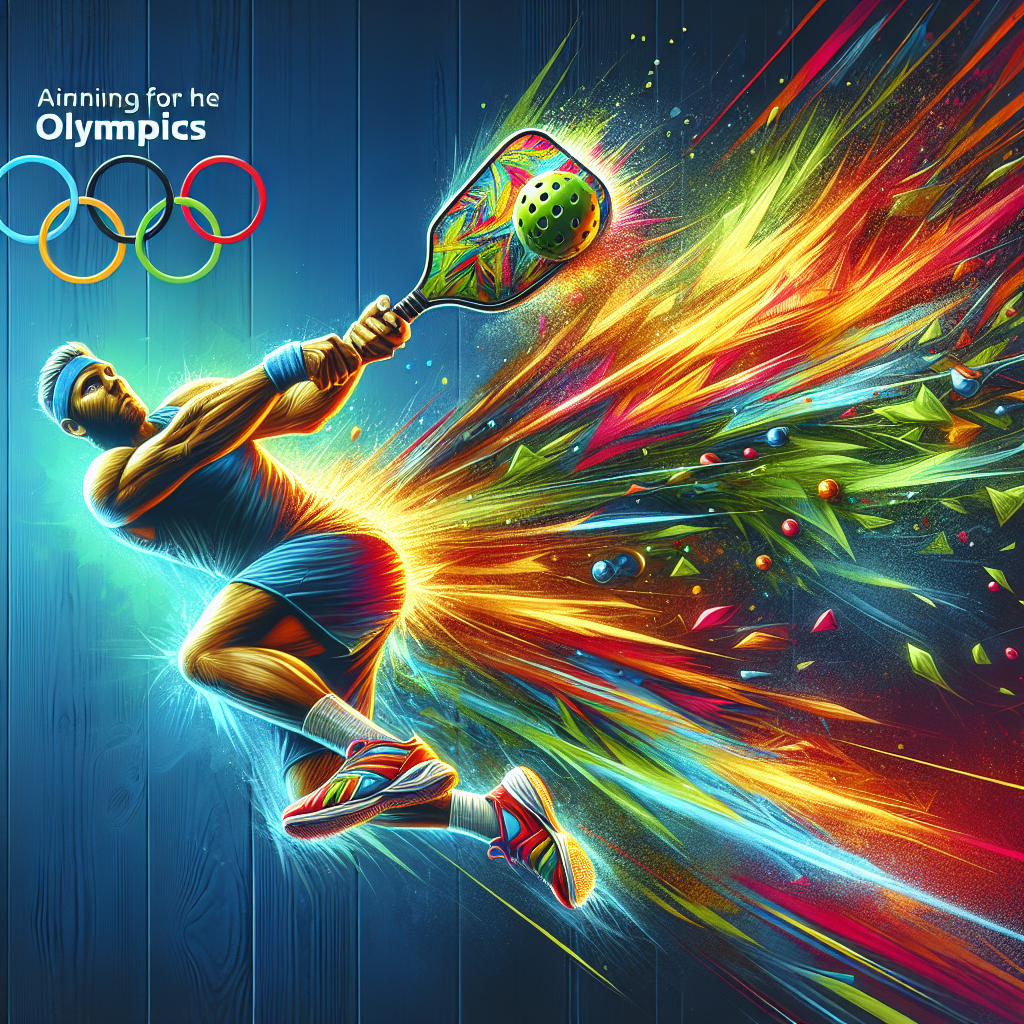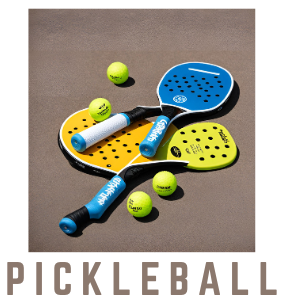Have you ever wondered if pickleball, the popular racket sport that combines elements of tennis, badminton, and ping pong, has made its way to the Olympic stage? Well, the answer might surprise you. Despite its growing popularity worldwide, pickleball has yet to be included in the prestigious roster of Olympic sports.
However, this hasn’t stopped enthusiasts and players from advocating for its inclusion, as they believe pickleball’s fast-paced and competitive nature would make it a perfect fit for the Olympics. So, let’s explore the current status of pickleball and its prospects of becoming an Olympic sport.

History of Pickleball
Invention of Pickleball
Pickleball, a unique paddle sport, was invented in 1965 on Bainbridge Island, Washington. The game was created when a group of friends, including Congressman Joel Pritchard, decided to improvise their usual badminton game due to the unavailability of the necessary equipment. They utilized a Wiffle ball, lowered the badminton net, and used handmade wooden paddles instead of racquets. This innovative adaptation quickly gained popularity among their families and friends, and the sport of pickleball was born.
Rise in Popularity
As word spread about this new and exciting game, more and more people began to embrace pickleball. It started to gain traction in retirement communities and leisure centers, appealing to individuals of all ages and skill levels. Thanks to its easy-to-learn rules and low-impact nature, pickleball became an accessible and enjoyable option for individuals seeking an active and social recreational activity. Tournaments and dedicated pickleball facilities started popping up across the United States, further fueling the sport’s popularity.
Introduction to International Competitions
Over time, pickleball began to expand beyond the borders of the United States. In the 1980s, the sport made its way to Canada, and later gained footholds in Europe, Asia, and Australia. International organizations such as the International Federation of Pickleball (IFP) and the Confederation of Pickleball Europe (CPE) were established to promote the sport and organize competitive events. The introduction of international competitions, including the World Pickleball Championships and the European Pickleball Championships, showcased the growing global reach and competitive nature of pickleball.
Criteria for Olympic Sports
Sport Recognition by International Federation
One of the key criteria for a sport to be considered for inclusion in the Olympics is its recognition by an international federation. The International Olympic Committee (IOC) expects sports to have a governing body that oversees the sport at the international level and ensures standardized rules and regulations are in place. Pickleball meets this criterion with the existence of the IFP, which serves as the global governing body for the sport.
Global Participation
Another crucial aspect considered by the IOC is the level of global participation in the sport. The Olympics aim to showcase sports that are widely practiced and valued in numerous countries worldwide. Pickleball’s rapid growth in popularity and its presence in over 100 countries demonstrate its potential to attract a significant number of participants from around the globe. The sport’s inclusive nature, where players of all ages and skill levels can compete together, further boosts its potential for international participation.
Gender Representation
Gender representation is an essential factor for Olympic sports. The IOC places great importance on achieving gender equality and strives to ensure equal opportunities for male and female athletes. Pickleball has shown to be a gender-inclusive sport, with mixed doubles matches being a popular and highly competitive format. The sport’s ability to provide equal opportunities for both male and female athletes contributes to its strong case for inclusion in the Olympics.
Anti-Doping Measures
To maintain the integrity of the Olympic Games, the IOC emphasizes the importance of anti-doping measures. Sports seeking Olympic recognition must have rigorous drug testing protocols in place to ensure fair competition and promote the health and safety of athletes. While pickleball currently does not have an extensive anti-doping system, the potential for implementing such measures exists as the sport continues to grow and develop.
Infrastructure Requirements
The IOC also considers the infrastructure requirements of potential Olympic sports. Venues should be readily available or easily adaptable to accommodate the needs of the sport. Pickleball’s flexibility allows it to be played on a variety of surfaces, including indoor and outdoor courts, making it adaptable to existing facilities in many countries. With relatively low infrastructure requirements compared to some other sports, pickleball holds an advantage in terms of cost-effectiveness and accessibility.
Popularity and Growth of Pickleball
Rapid Growth in Participation
Pickleball has experienced tremendous growth in participation over the past few decades. The sport’s appeal lies in its accessibility and low barrier to entry, attracting both recreational and competitive players. The compatibility of pickleball with different age groups, fitness levels, and abilities has led to its popularity among diverse communities worldwide. In the United States alone, participation in pickleball has increased by over 650% in the last ten years, highlighting its exponential growth.
Inclusion in Senior Games
One significant milestone in pickleball’s popularity was its inclusion in the National Senior Games, a multi-sport event for athletes aged 50 and above. This recognition further solidified pickleball as a legitimate and respected sport. As the Senior Games continue to attract a large number of participants, pickleball’s presence in this esteemed event showcases its appeal and potential for inclusion on a grander stage, such as the Olympics.
Media Coverage and Sponsorships
The exponential growth of pickleball has not gone unnoticed by the media and potential sponsors. Major television networks and sports channels have started broadcasting pickleball matches and tournaments, exposing the sport to a wider audience. Media coverage plays a crucial role in generating public interest and awareness, ultimately contributing to the growth of pickleball. Sponsors seeking to reach a diverse and active demographic have also recognized the value of aligning their brands with pickleball, leading to increased financial support and resources for the sport.
Efforts to Make Pickleball an Olympic Sport
Initial Lobbying and Advocacy
The quest to make pickleball an Olympic sport began with the passionate lobbying and advocacy efforts of its dedicated community. Pickleball associations, national federations, and influential individuals have actively campaigned for the sport’s recognition and inclusion in the Olympics. They have presented the sport’s attributes, including its widespread appeal and growing international presence, to various sporting bodies and decision-makers in an effort to garner support.
Professional Pickleball Associations
The establishment of professional pickleball associations has played a crucial role in advancing the sport’s case for Olympic recognition. These associations help streamline the sport’s development, governance, and organization of professional competitions. They work towards elevating the standard of play, implementing standardized rules, and enhancing the overall professionalism of pickleball. The presence of professional associations demonstrates the dedication and seriousness the sport brings to compete at a higher level, aligning it more closely with Olympic values.
Participation in Multi-Sport Events
In recent years, pickleball has actively participated in multi-sport events such as the World Games, an international sports event featuring sports not included in the Olympic program. By showcasing the sport’s elite players and competitive matches on an international platform, pickleball has gained exposure and heightened its profile among sporting communities. Inclusion in multi-sport events presents an opportunity for pickleball to demonstrate its ability to engage athletes and spectators alike, solidifying its position as a bona fide Olympic sport.
Challenges and Obstacles
Competition from Established Olympic Sports
One of the primary challenges facing pickleball in its pursuit of Olympic recognition is the competition from well-established Olympic sports. These sports have a long history, tradition, and established infrastructure that give them a competitive advantage. The limited number of spots available in the Olympic program and the stringent selection process make it difficult for emerging sports like pickleball to secure a place. However, with its unique characteristics and growing popularity, pickleball presents a compelling case for breaking through the barriers.
Resistance from International Olympic Committee
The International Olympic Committee, the ultimate authority in deciding which sports are included in the Olympics, has shown some resistance towards adding non-traditional sports to the program. The IOC’s emphasis on maintaining the Olympic values and carefully selecting sports that align with its ideals poses a challenge for emerging sports like pickleball. However, through continued advocacy, showcasing the sport’s growth and potential, and addressing any concerns raised by the IOC, pickleball has the opportunity to win over decision-makers and pave its way to Olympic recognition.
Competitive Balance and Talent Pool
As with any sport seeking Olympic status, pickleball must address concerns regarding competitive balance and the depth of its talent pool. The sport’s growth has primarily occurred in a few countries, and the majority of elite players hail from those regions. To be considered for the Olympic program, pickleball needs to demonstrate a global talent pool with a substantial number of highly skilled athletes who can compete at the highest level. Efforts to expand the sport’s reach and develop talent internationally are crucial in overcoming this obstacle.
Case Studies of Other Non-Traditional Olympic Sports
Table Tennis
Table tennis, often considered a non-traditional sport, successfully transitioned from a casual backyard activity to an Olympic sport. Similar to pickleball, table tennis gained popularity at the grassroots level and showcased its potential to engage a wide range of participants. With concerted efforts, table tennis established a strong international federation, demonstrated global participation, and enhanced its competitiveness, leading to its inclusion in the Olympic program in 1988.
BMX Cycling
BMX cycling, a freestyle cycling sport that originated in the United States, faced many of the same challenges pickleball currently encounters. However, through tireless advocacy and the establishment of international federations and professional associations, BMX cycling successfully demonstrated its ability to attract a youthful demographic, showcase high-flying stunts, and provide thrilling competition. These efforts culminated in BMX’s inclusion in the 2008 Beijing Olympics, marking a significant achievement for the sport.
Trampoline
Trampoline, originally seen as a circus act, made its way to the Olympics by showcasing its unique athleticism and entertainment value. The sport’s global governing body, the International Gymnastics Federation, successfully promoted trampoline and demonstrated its international participation. With its breathtaking acrobatics and dedicated athlete base, trampoline gained recognition and secured a place in the Olympic program beginning in 2000.
Beach Volleyball
Beach volleyball, a variation of traditional indoor volleyball, emerged as a vibrant and popular sport in coastal regions worldwide. By highlighting the sport’s beach culture, spectator-friendly atmosphere, and its appeal to television audiences, beach volleyball caught the attention of the IOC. The sport quickly gained momentum, successfully meeting the criteria for global participation and gender representation, leading to its inclusion in the Olympics in 1996.
Potential Benefits of Pickleball as an Olympic Sport
Global Exposure and Recognition
Inclusion in the Olympic Games offers unparalleled global exposure and recognition for a sport. Becoming an Olympic sport would introduce pickleball to millions of viewers worldwide, attracting new participants and generating increased interest in the sport. The prestige and media coverage associated with the Olympics would provide pickleball with a platform to highlight its unique characteristics, values, and potential for growth on a global scale.
Increased Funding and Sponsorship
A significant advantage of Olympic recognition is the potential for increased funding and sponsorships. National Olympic committees and governing bodies often provide financial support to Olympic sports, enabling them to invest in athlete development programs, coaching, competitions, and infrastructure. Additionally, the heightened visibility of Olympic sports attracts commercial sponsors seeking to associate their brands with the excitement and values of the Games. Increased funding and sponsorships would bolster pickleball’s growth, accessibility, and professionalism.
Youth Engagement and Participation
Becoming an Olympic sport would greatly impact youth engagement and participation in pickleball. The Olympic Games serve as a source of inspiration and aspiration for young athletes, motivating them to pursue sports and achieve their athletic dreams. Olympic recognition would provide pickleball with an opportunity to connect with younger generations, fostering their interest in the sport and encouraging their involvement at both the grassroots and competitive levels. Increased youth participation would secure the sport’s long-term growth and ensure a sustainable pipeline of talent.
Arguments Against Pickleball as an Olympic Sport
Limited International Appeal
One of the arguments against pickleball’s inclusion in the Olympics is the perception of limited international appeal. Critics argue that pickleball’s popularity is mainly concentrated in certain regions, primarily the United States, and lacks widespread participation across the globe. However, as the sport continues to expand and gain traction in more countries, this argument becomes less convincing. The growing number of international pickleball tournaments and the sport’s presence in multi-sport events indicate the increasing global appeal of pickleball.
Lack of Tradition and History
Another argument raised against pickleball as an Olympic sport is its relatively short history and lack of traditional roots compared to established Olympic sports. Proponents of traditional sports argue that the Olympics should prioritize sports with long-standing historical significance. While it is true that pickleball is a relatively recent invention, its rapid growth, inclusivity, and unique characteristics make it a compelling addition to the Olympic program. The Olympics have a history of welcoming new sports that capture the spirit of the times.
Concerns About Professionalism
Some critics express concerns about pickleball’s level of professionalism, citing the sport’s predominantly recreational origins and the perception of it being a leisurely game. However, the establishment of professional pickleball associations, the development of high-quality equipment, and the growing competitiveness at the elite level reflect a shift toward a more professionalized sport. The presence of professional players, prize money, and structured tournaments demonstrate pickleball’s capability to rival other Olympic sports in terms of professionalism and athletic excellence.

Pickleball and the International Olympic Committee
Inclusion in the World Games
While pickleball awaits potential Olympic status, its participation in the World Games provides an important stepping-stone. The World Games, organized by the International World Games Association and recognized by the IOC, brings together a diverse range of non-Olympic sports. Inclusion in the World Games allows pickleball to gain further exposure, build relationships with international sporting bodies, and showcase its athletes’ talents on a global stage. The experience and recognition gained from the World Games create a solid foundation for future Olympic aspirations.
Future Prospects for Olympic Status
Pickleball’s journey towards Olympic status is filled with challenges, but the sport possesses key attributes that align with the Olympic values of excellence, friendship, and respect. As the sport continues to grow in popularity and engage players from different demographics worldwide, the prospects for Olympic recognition become increasingly promising. Continued lobbying efforts, active international participation, enhanced professionalism, and addressing concerns raised by the IOC are essential steps in fulfilling pickleball’s aspirations of becoming an Olympic sport.
Conclusion
Pickleball, a sport born out of improvisation and creativity, has experienced remarkable growth and popularity since its invention in 1965. With its unique characteristics, global appeal, and the ongoing efforts to develop and professionalize the sport, pickleball stands as a strong candidate for Olympic status. While it faces challenges and obstacles, pickleball has the potential to overcome these hurdles and gain recognition as an Olympic sport. Olympic inclusion would provide pickleball with unparalleled opportunities for global exposure and growth, increased funding and sponsorships, and enhanced youth engagement. By continuing to make its case to the International Olympic Committee, pickleball can aspire to join the elite ranks of Olympic sports and inspire athletes for generations to come.

